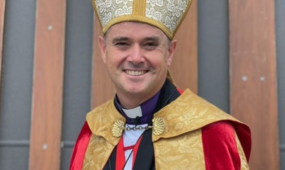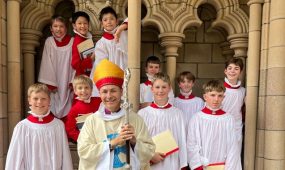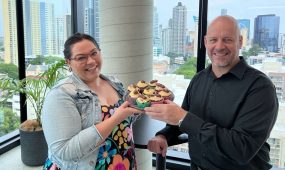Q&A with former ABM missionary, carpentry enthusiast and grandfather, The Ven. Jim Nolan
Spotlight Q&A
Meet The Ven. Jim Nolan, who recently retired after 50 years of priestly ministry, and find out about his unusual childhood experiences, the highlights of his ministry, where he does his best thinking, how prayer and silence orientate him and the various clergy and lay people who have made an impact on him
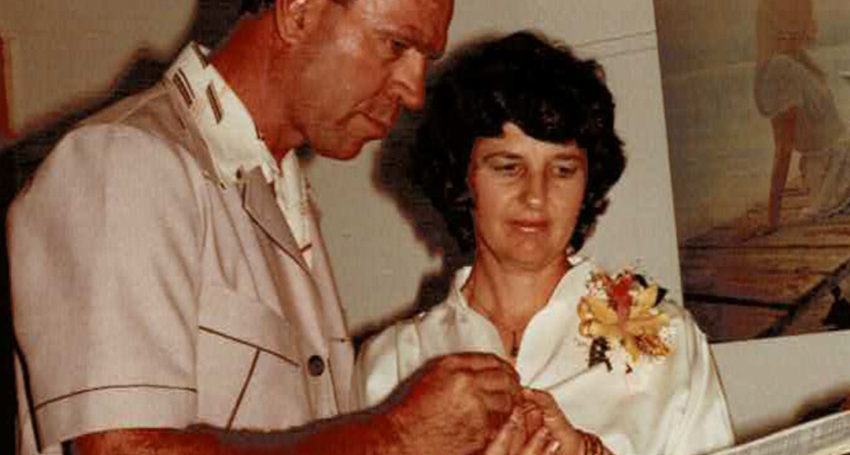
The Ven. Jim Nolan recently retired after 50 years of priestly ministry. He is married to Fay and they have four children, two boys and two girls aged between 49 and 53, and are also blessed with five grandchildren, aged between 16 and 27. They also “have a little ‘fur child’ called Cindy who brings lots of joy.”
Where do you currently live and where do you worship?
I currently live in the Brisbane suburb of Eatons Hill and I worship at The Parish of Chermside, where I am an Honorary Assistant priest.
How long have you been involved in the Anglican Church and in what roles?
I first really got involved while boarding at the Southport School when I was 10 years old and was given special permission to join the Roma Parish Council at 17 years of age. In 1963 I went to the Anglican Board of Mission House of the Epiphany Training College, following which I went to the then Mitchell River and Edward River Missions on the Cape York Peninsula. I was ordained a priest in 1970 and have served in the Parishes of Ayr, Ingham, Hughenden, Richmond, Charters Towers, Collinsville, The Parish of Pioneer Valley and Home Hill which are all located in the Diocese of Northern Queensland, as well as in the Parishes of Dalby, Samford, and Locum at Greenhills, Bramble Bay and Chermside.
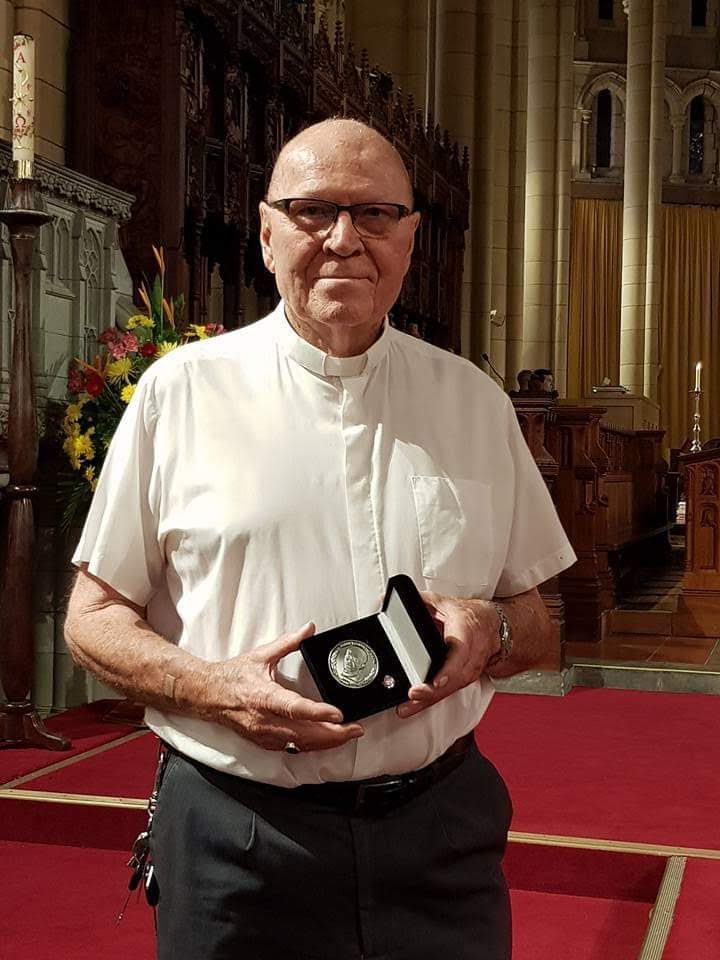
Archbishop Phillip Aspinall presented Jim with this Coaldrake Award Citation in 2018 for his missionary work in the Gulf of Carpentaria during the 1960s
What is your current role, including any voluntary roles, and what does your role involve?
I am currently a retired Honorary Assistant priest at the Parish of Chermside where my main focus is to help with the church services and support elderly people living in aged-care homes, where I hold services and spend time talking to the residents.
What projects and/or activities are you currently working on?
At the moment I am taking some time out from visiting aged care homes due to COVID-19. In the parish, I am mainly doing monthly Sunday services and fortnightly Wednesday services. This takes the load off the Rector, as Fr Daniel Jayaraj is very busy with outreach and social justice activities, including helping to run a soup kitchen twice weekly, an op shop five days a week, an emergency food relief pantry four days per week and attending to community emergencies.
What have been the highlights of your 50 years of priestly ministry so far?
One day in 1994, I visited a man in a palliative care facility who was expected to pass away within a few hours of my visit. Unexpectedly, he came out of hospital a couple of days later and started coming to church where he was baptised and confirmed. He became an active member of the Parish of Home Hill and also started bringing his adult son along with him. He died some years later, just before I left the parish.
What advice do you have for those considering the priesthood in our Diocese?
If you feel called to ordained ministry in any form, you need to be prepared to be a pastor to the people in your care – to love them and to be available to them when they need you.
What did you do before you became a priest?
Prior to becoming a priest, I grew up on a sheep and cattle station near Roma. I spent six years at The Southport School between the ages of 10 and 16 years. After leaving school and the property, I worked on a couple of dairy farms, did some bulldozer driving, and joined the staff of Brown’s Transport Company in Toowoomba, where I probably learned more than any other place I’ve ever been. Following this, at the age of 21years, I went to the mission field in Cape York for three years as a missionary for the Anglican Board of Mission, where I was able to use the skills I had learned in stock work and in transport. I was accepted as a candidate for ordination by Bishop Ian Shevill of the Diocese of North Queensland and attended St Francis College at the completion of my missionary work.
What have been the key challenges of your roles so far and how have you worked through these?
One of the great challenges of being a priest of a small parish is finding enough money to make things work and to keep church buildings maintained. I can’t count the number of rectories I have painted or church halls I have helped repair.
What are your plans and goals for the next 12 months?
Once COVID-19 passes, I am keen to start ministering in aged-care homes again and to continue to be of help in the Parish of Chermside whenever I can. I am also keen to visit my granddaughters in England and Alice Springs as soon as I can – one of my granddaughters is a town planner for an engineering firm in London and the other is an ABC TV News reporter. I also have three other grandchildren living in Townsville.
Can you tell us a little about your personal faith journey?
I have a pretty simple faith, which really does work for me. My faith is strong, but simple. I have been practising my faith since I was a child. When I was seven years old, I had scarlet fever and needed to live in isolation in an old house on a property about half a kilometre from home so I was away from other children. My faith in God kept me strong and because of my faith, I was only ever afraid once – during a severe western storm which nearly ripped the roof off.
How does your faith inspire you and shape your outlook, life choices and character?
The simple answer to that is that my faith orientates me in the situations of ministry in which I find myself. For example, I once visited a teenager in hospital who had given up her baby for adoption and was traumatised as a result. A few years later, I was called out to assist a person in a different town who was at risk of suicide – the person was the same young woman. In situations like this, I need to trust in God, be prepared to listen and be discerning about what I say.
What is your favourite scripture and why?
My favourite scripture is in 1 Kings 19 where Elijah is confronted by God through earthquake, wind and fire, but only finds Him in the sound of sheer silence. I have always found God in the quietness, but never in demonstrations of great force. I do find God in the stillness of silence, not in the way that people in the Gospel stories wanted Him to do miracles as proof of His nature. I don’t find God in what most people would call spectacular situations, but rather in the quietness that we experience when we really seek for God Himself.
What are the primary strengths of the Church and what is the best way to make the most of these for the benefit of our communities?
Parish priests have a unique voice and I really think that it is important that we use that voice in the right way – it’s important that priests use their voices in positive and constructive ways, rather than falling into negativity. Jesus, Paul and the early Church all approached the problem of portraying the Gospel by being positive. Being negative seldom helps anything and so, as we speak, our message must be clear, positive and full of hope.
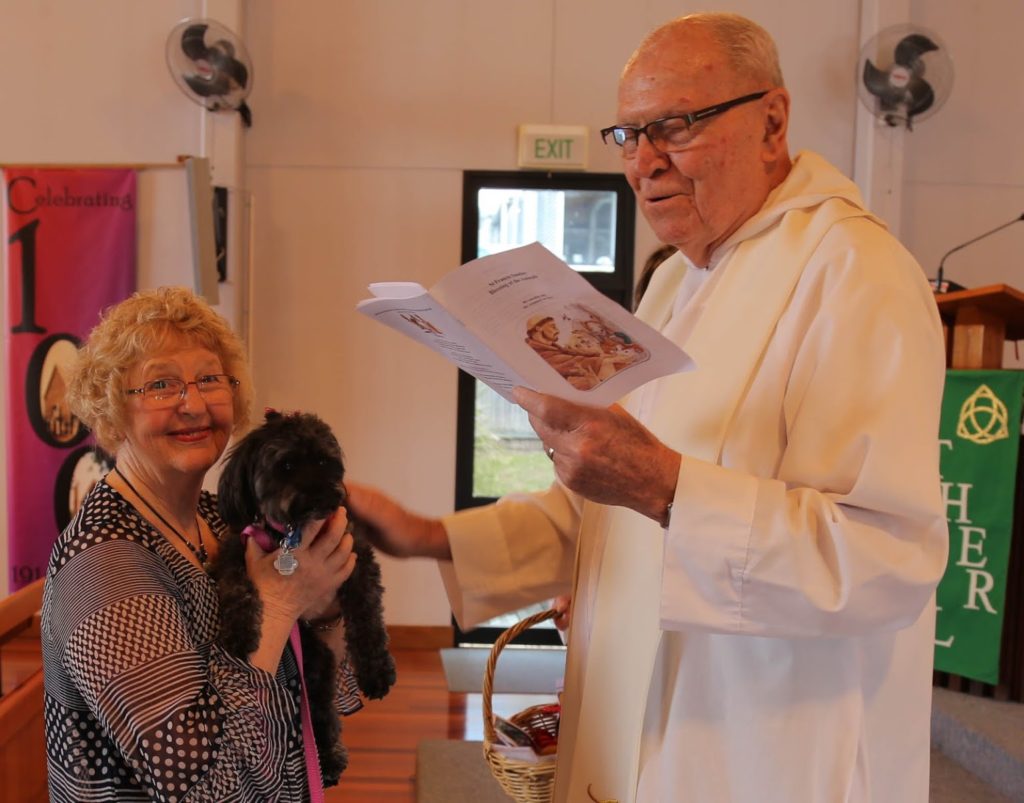
“It is always a great joy to bless the pets on the Feast of St Francis. Fay is hoping that our little ‘fur child’ will benefit from a blessing!”
What are the primary challenges currently encountered by the Church and what is the best way to overcome these for the benefit of our communities?
Our calling is to be Jesus to people and present His Gospel at every opportunity we have. Fr Daniel at the Parish of Chermside always seems to be able to find funding for the programmes and initiatives the parish wishes to implement, and this is very important. This gift that Fr Daniel has is a great gift and not one we all possess, nevertheless our challenge is to strive to present Jesus to the people and be able to fund the programmes we feel will be of assistance. The Church has a responsibility to care for both parishioners and people in the wider community.
What is the best piece of advice you have ever received and who gave you this advice?
One piece of advice that I hold onto was given to me from (I think) Canon Ivor Church who once said, “In all situations, pray to God and always accept the answer.” This advice has helped me in many situations. One time I presided over the funeral of three family members who had all died in a car accident, which I found very hard. I prayed to God and accepted his answer, which I felt was to keep moving forward with supporting the community in their grief and presiding over the funeral – step by step.
What is the kindest gesture you have ever received or witnessed?
I was friendly with an Ingham family in 1973 and this family had a son and two daughters. The son was killed in a car accident at only 19 years old. The youngest daughter was 11 years old and I remember sitting on the back steps with her not knowing what on earth to say. Fifteen years later this girl wrote to thank me for how I had supported her through her grief and how, as a result, she became a social worker. I still have her letter – I was overwhelmed by both her thoughtfulness and knowing that I had been of some help.
What person of faith inspires you the most and why?
Probably Archdeacon Cyril Brown, who was the chaplain of Edward River Mission, because he was a ‘real’ person – he just went about his business the way that you do. I once made a derogatory comment about someone who was a ‘lefty radical’. The Ven. Cyril, replied with, “You shouldn’t say things like that about radicals – I was once a radical myself and spent a night in jail after demonstrating with suffragettes.”
What do you do in your free time to recharge and relax?
I have a big workshop at the bottom of my garden where I like to work on carpentry, welding and building projects.
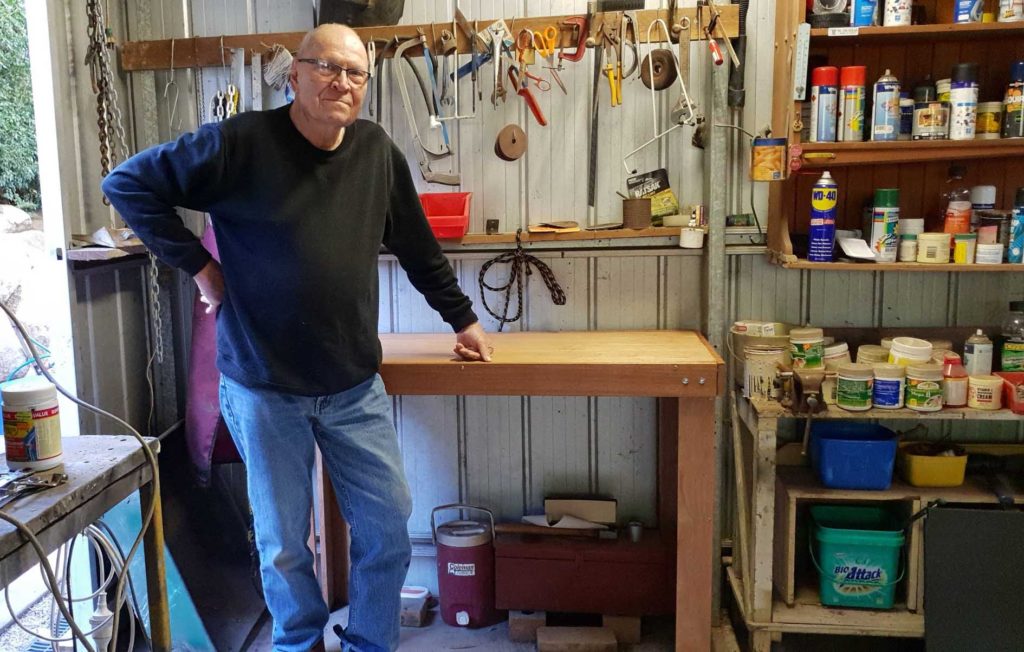
“Be it ever so humble – I just love spending quiet time pottering in my shed. I just completed another bench because the three I had were full of ‘junkl’!”
If you found yourself on a deserted island, what three things would you choose to have with you?
I would choose to have my wife Fay, an axe to build a shelter and wire netting to make fish traps.
If you could have a billboard with any text on it, what would it say and why?
“All things work for good for those who love God (Romans 8.28)”, as this is a great thing to remember when you find yourself in strife.
What book have you given away most as a gift and why?
A copy of the New Testament because people who come to chat in both difficult and good times find that the New Testament helps them in difficult times and encourages people in good times.
Where do you do your best thinking?
Mostly in a comfortable place of solitude, such as when I am in my workshop.
What’s your best childhood memory?
Probably the scarlet fever episode because I quite liked the independence of being by myself.
If you are having a bad day, what do you do to cheer yourself up?
I work through it and do whatever I can to make it better – praying or tinkering in my workshop. Talking to Fay is one of the best ways to get back on track on a tough day.
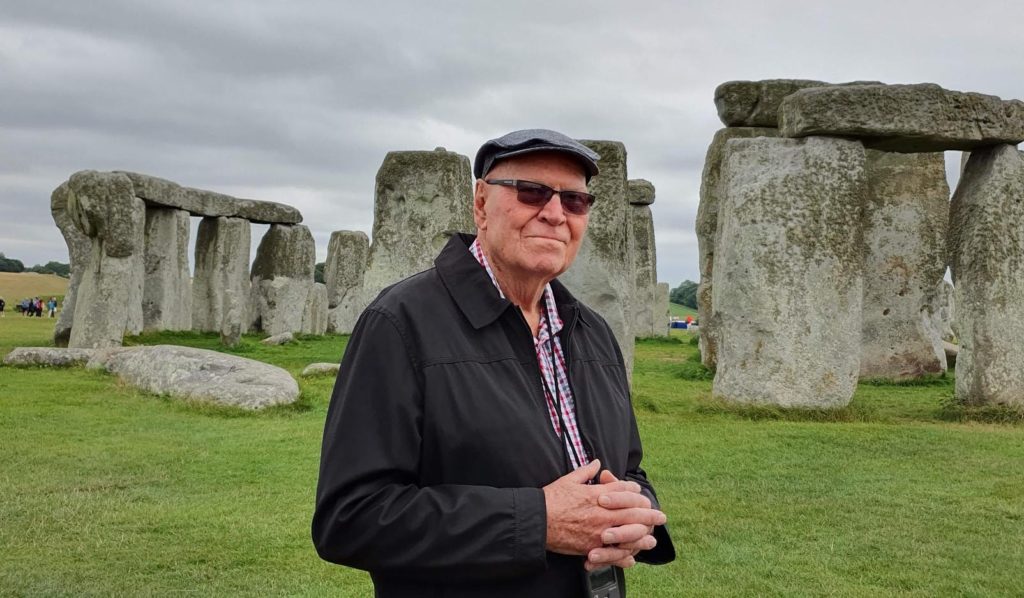
“Fay and I love to travel: we had the privilege to do some travelling around the UK last year. Stonehenge was just one of the many ‘wonders’ we saw”
What makes you nostalgic and why?
I love to look back on some of the places I have been – especially when I was in the mission field.
What’s your unanswerable question – the question you are always asking yourself?
‘Why me? Why did you call me to be a Priest, Lord?’

